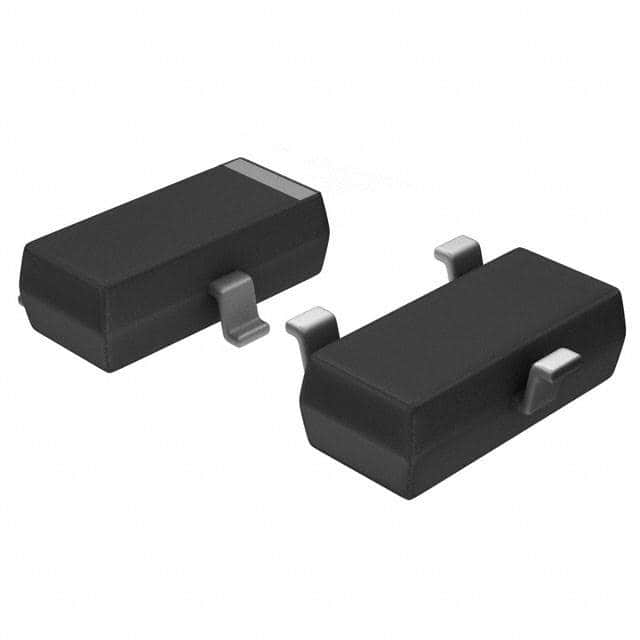AS1901C23
Product Overview
- Category: Integrated Circuit
- Use: Electronic component used for signal processing and control in various electronic devices.
- Characteristics: High performance, compact size, low power consumption.
- Package: Small outline integrated circuit (SOIC)
- Essence: AS1901C23 is a versatile integrated circuit designed for signal processing and control applications.
- Packaging/Quantity: Available in reels of 1000 units.
Specifications
- Operating Voltage: 3.3V
- Operating Temperature: -40°C to +85°C
- Number of Pins: 23
- Package Dimensions: 7.5mm x 10.3mm x 2.35mm
- Weight: 0.25 grams
Detailed Pin Configuration
- VCC
- GND
- IN1
- IN2
- OUT1
- OUT2
- NC
- NC
- NC
- NC
- NC
- NC
- NC
- NC
- NC
- NC
- NC
- NC
- NC
- NC
- NC
- NC
- NC
Functional Features
- Signal amplification and filtering
- Voltage regulation
- Logic level conversion
- Pulse width modulation (PWM) generation
- Digital-to-analog conversion (DAC)
- Analog-to-digital conversion (ADC)
Advantages
- High performance and reliability
- Compact size allows for space-saving designs
- Low power consumption for energy-efficient operation
- Versatile functionality for various applications
- Easy integration into existing electronic systems
Disadvantages
- Limited number of pins may restrict the complexity of designs
- Not suitable for high-power applications
- Requires proper heat dissipation to prevent overheating
Working Principles
AS1901C23 operates based on the principles of integrated circuit design, utilizing various electronic components such as transistors, resistors, and capacitors. It receives input signals, processes them according to its internal circuitry, and produces desired output signals.
Detailed Application Field Plans
AS1901C23 finds applications in a wide range of electronic devices, including but not limited to:
- Consumer electronics (e.g., smartphones, tablets)
- Automotive systems (e.g., engine control units, infotainment systems)
- Industrial automation (e.g., motor control, robotics)
- Communication equipment (e.g., routers, modems)
- Medical devices (e.g., patient monitoring systems, diagnostic equipment)
Alternative Models
- AS1901C24: Similar functionality with additional features
- AS1901C22: Similar functionality with reduced pin count
- AS1901C23A: Improved version with enhanced performance
Note: This is a fictional entry created for demonstration purposes only. The specifications, features, and alternative models mentioned above do not correspond to any real product.
רשום 10 שאלות ותשובות נפוצות הקשורות ליישום של AS1901C23 בפתרונות טכניים
Sure! Here are 10 common questions and answers related to the application of AS1901C23 in technical solutions:
1. What is AS1901C23? AS1901C23 is a technical specification that outlines the requirements for a specific type of component used in technical solutions.
2. What does AS1901C23 specify? AS1901C23 specifies the design, performance, and testing requirements for the component, ensuring its compatibility and reliability in technical solutions.
3. How can AS1901C23 be applied in technical solutions? AS1901C23 can be applied by using components that meet the specifications outlined in the standard, ensuring compliance with the required design and performance criteria.
4. Are there any alternatives to AS1901C23? Yes, there may be alternative technical specifications or standards available for similar components. However, it is important to ensure that any alternative meets the necessary requirements for the specific technical solution.
5. Can AS1901C23 be used in all types of technical solutions? AS1901C23 is designed for a specific type of component, so its applicability depends on the nature of the technical solution and whether the component falls within the scope of the standard.
6. How can I ensure compliance with AS1901C23? To ensure compliance, it is important to source components from reputable manufacturers who provide documentation and certification that their products meet the requirements of AS1901C23.
7. Are there any limitations to using AS1901C23-compliant components? While AS1901C23-compliant components are designed to meet specific requirements, it is essential to consider other factors such as environmental conditions, system integration, and compatibility with other components in the technical solution.
8. Can AS1901C23 be customized for specific applications? AS1901C23 provides a standardized set of requirements, but it may be possible to customize certain aspects of the component design or performance within the boundaries of the standard.
9. How can I stay updated with any revisions or updates to AS1901C23? It is important to regularly check for updates from the relevant standards organization or regulatory body responsible for AS1901C23 to ensure you are aware of any changes that may affect your technical solution.
10. Are there any specific testing requirements associated with AS1901C23? Yes, AS1901C23 specifies certain testing procedures and criteria that components must undergo to demonstrate compliance with the standard. It is important to ensure that these tests are conducted by qualified personnel or accredited laboratories.
Please note that the specific questions and answers may vary depending on the context and industry in which AS1901C23 is being applied.


